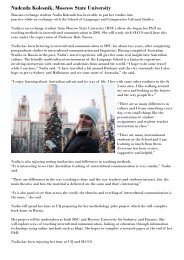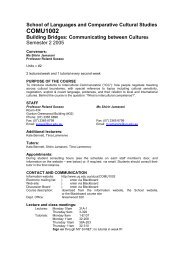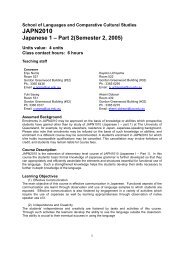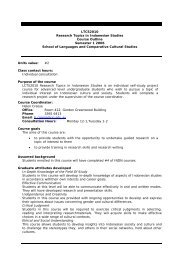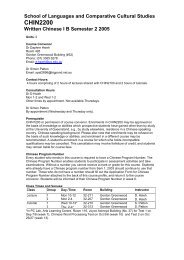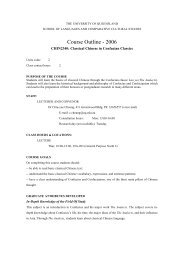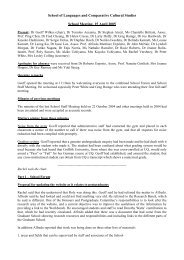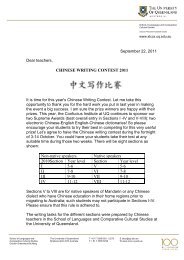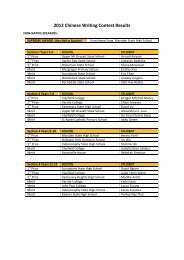Course Outline - School of Languages & Comparative Cultural ...
Course Outline - School of Languages & Comparative Cultural ...
Course Outline - School of Languages & Comparative Cultural ...
Create successful ePaper yourself
Turn your PDF publications into a flip-book with our unique Google optimized e-Paper software.
Language Testing and Assessment<br />
SLAT7835<br />
<strong>School</strong> <strong>of</strong> <strong>Languages</strong> and <strong>Comparative</strong> <strong>Cultural</strong> Studies<br />
2006<br />
2 Units<br />
6-9 PM Wednesday<br />
Robert C Kleinsasser<br />
418 Gordon Greenwood Building – Office Consultations 2-4 Thursdays and email<br />
3365 6718 (<strong>of</strong>fice) 3365 6799 (fax) email: r.kleinsasser@mailbox.uq.edu.au<br />
Library Liaison Officer – Birgit Culloty - Bculloty@library.uq.edu.au 3365 2160<br />
Purpose <strong>of</strong> the course<br />
The course is a survey <strong>of</strong> issues in language testing and assessment, designed to introduce the<br />
student to underlying principles <strong>of</strong> language testing and assessment and to provide experience<br />
in critiquing and developing second language classroom test and assessment materials.<br />
<strong>Course</strong> goals<br />
On completing this course students will be able to:<br />
1. Recognize critical perspectives on the uses <strong>of</strong> language tests<br />
2. Appraise the value <strong>of</strong> language test items and language test designs<br />
3. Differentiate various issues (both practical and theoretical) in language testing and<br />
assessment<br />
4. Design test items following Bachman & Palmer’s (1996) six qualities <strong>of</strong> language tests<br />
Assumed background<br />
The students will be able to use information from various courses in Applied Linguistics to<br />
help develop test and assessment items. For instance, a model <strong>of</strong> communicative competence<br />
can serve as a construct when considering construct validity. Issues from applied linguistics<br />
such as psycholinguistics, sociolinguistics, syntax, phonology, etc., can help guide and<br />
challenge test and assessment development. Issues from second language acquisition can<br />
inform expectations <strong>of</strong> what students can do with various language testing items.<br />
Teaching and learning modes and general information<br />
Discussions, Lectures, Workshops, Cooperative Learning, Portfolio Development<br />
(Various Information Processing, Social, Personal, and Behavioural Teaching Models)<br />
This is a two unit course. You will be expected to be in class for the 3 hours each Wednesday<br />
and spend 7 hours in preparation on the course per week on your own. It is important to read<br />
assigned texts and prepare yourself with the information so you will be able to participate in<br />
class discussions and workshops. You should keep notes about what you read, and write<br />
down questions that you might have. This is a postgraduate course and students are expected<br />
to scholarly critique and discuss the issues read for class, not just repeat them back or
SLAT7835 Language Testing and Assessment 2<br />
memorise them. The lecturer reserves the right to implement pop quizzes should it become<br />
evident students have neither read nor prepared for class discussions and activities.<br />
Punctuality is encouraged and expected. Participate in class discussions and activities.<br />
As a courtesy to all human beings, any electronic devices (e.g., phones, pagers, watch alarms)<br />
should be turned <strong>of</strong>f during class sessions. Students will be asked to leave the class session if<br />
such interruptions occur.<br />
Required and recommended texts and references<br />
Required Texts-<br />
Bachman, L. F., & Palmer, A. S. (1996). Language testing in practice. Oxford: Oxford<br />
University Press.<br />
Shohamy, E. (2001). The power <strong>of</strong> tests: A critical perspective on the uses <strong>of</strong> language tests.<br />
New York, NY: Longman Pearson Education.<br />
Chapter 3 from: McNamara, T. (1996). Measuring second language performance. London:<br />
Longman. (SS&H Library High Use)<br />
Lantolf, J. P., & Poehner, M. E. (2004). Dynamic assessment <strong>of</strong> L2 development: Bringing<br />
the past into the future. Journal <strong>of</strong> Applied Linguistics, 1 (1), 49-72. (available through UQ<br />
Library website)<br />
Poehner, M. E., & Lantolf, J. P. (2005). Dynamic assessment in the language classroom.<br />
Language Teaching Research, 9 (3), 233-265. (available through UQ Library website)<br />
Chapters 5, 6, 7, & 8 from: Stiggins, R. J. (2001). Student involved classroom assessment (3 rd<br />
ed.). Prentice Hall College Division. (SS&H Library High Use)<br />
Other Helpful Texts-<br />
Alderson, J. C., & Banerjee, J. (2001). Language testing and assessment (Part 1). Language<br />
Teaching, 34, 213-236. (SS&H Library High Use)<br />
Alderson, J. C., & Banerjee, J. (2002). Language testing and assessment (Part 2). Language<br />
Teaching, 35, 79-113. (SS&H Library High Use)<br />
Bachman, L. F. (1990). Fundamental considerations in language testing. Oxford: Oxford<br />
University Press.<br />
Blaz, D. (2001). A collection <strong>of</strong> performance tasks and rubrics foreign languages.<br />
Larchmont, NY: Eye On Education.<br />
Davidson, F., & Lynch, B. K. (2002). Testcraft: A teacher’s guide to writing and using<br />
language test specifications. New Have, CT: Yale University Press.<br />
Falk, B. (2000). The heart <strong>of</strong> the matter: Using standards and assessment to learn.<br />
Portsmouth, NH: Heinemann.<br />
Gipps, C. V. (1994). Beyond testing: Towards a theory <strong>of</strong> educational assessment. London:<br />
The Falmer Press.<br />
Guskey, T. R. (1996). Communicating student learning: 1996 ASCD Yearbook. Alexandria,<br />
VA: Association for Supervision and Curriculum Development.<br />
Hebert, E. A. (2001). The power <strong>of</strong> portfolios: What children can teach us about learning<br />
assessment. San Francisco, CA: Jossey-Bass.
SLAT7835 Language Testing and Assessment 3<br />
Kirschenbaum, H., Simon, S. B., & Napier, R. W. (1971). Wad-ja-get The grading game in<br />
American education. New York: Hart Publishing Company, Inc.<br />
Marzano, R. J., Pickering, D., & McTighe, J. (1993). Assessing student outcomes:<br />
Performance assessment using the dimensions <strong>of</strong> learning model. Alexandria, VA:<br />
Association for Supervision and Curriculum Development.<br />
McNamara, T. (1996). Measuring second language performance. New York: Longman.<br />
Niyogi, N. S. (1995). The intersection <strong>of</strong> instruction and assessment: The classroom.<br />
Princeton, NJ: Educational Testing Service.<br />
Pellegrino, J. W., Chudowsky, N., & Glaser, R. (2001). Knowing what students know: The<br />
science and design <strong>of</strong> educational assessment. Washington, DC: National Academy Press.<br />
Stiggins, R. J. (2001). Student involved classroom assessment (3 rd ed.). Prentice Hall College<br />
Division.<br />
Wiggens, G. (1998). Educative assessment: Designing assessments to inform and improve<br />
student performance. San Francisco: Jossey-Bass.<br />
Style Manual<br />
American Psychological Association. (2001). Publication manual <strong>of</strong> the American<br />
psychological association (5th ed.). Washington, DC: American Psychological Association.<br />
Resources required and available<br />
Bachman & Palmer (1996) and Shohamy (2001) texts can be purchased from campus<br />
bookshop or www.amazon.com. Stiggins’ book (where his four chapters are) and<br />
McNamara’s book (where his chapter is) can be accessed in the high use area <strong>of</strong> the Social<br />
Science and Humanities Library. The articles by Lantolf & Poehner and Poehner & Lantolf<br />
can be accessed through UQ Library website. The style manual can be purchased from<br />
campus bookshop, www.amazon.com or found in the Social Sciences and Humanities<br />
Library.<br />
University Learning Resources<br />
Additional course resources and subject area FindIts are available on the Library website<br />
(http://www.library.uq.edu.au/eres/)<br />
The University <strong>of</strong>fers a range <strong>of</strong> resources and services to support student learning. Details<br />
are available on the myServices website (https://student.my.uq.edu.au/)<br />
Lecture and other contact schedule (tentative)<br />
Week One (1 March)<br />
Introduction and Assessment Task<br />
RA(Reading assignment for next week): Bachman & Palmer, Chapters 1 & 2<br />
Week Two (8 March)<br />
Qualities <strong>of</strong> Language Tests<br />
RA: McNamara (1996) chapter 3<br />
Week Three (15 March)<br />
Modelling performance: Opening Pandora’s box<br />
RA: Shohamy, Parts I & II
SLAT7835 Language Testing and Assessment 4<br />
Week Four (22 March)<br />
The Power <strong>of</strong> Tests, Uses <strong>of</strong> tests: Studies and cases<br />
RA: Shohamy, Parts III & IV<br />
Week Five (29 March)<br />
Uses <strong>of</strong> tests: Conclusions and interpretations, Democratic perspectives <strong>of</strong> testing<br />
RA: Stiggins, Chapter 7<br />
Week Six (5 April)<br />
Performance assessment: Rich with possibilities<br />
RA: Stiggins, Chapter 8<br />
Week Seven (12 April)<br />
Personal communication: Immediate information about achievement<br />
RA: Stiggins, Chapter 5<br />
19 April: Mid-term Break<br />
Week Eight (26 April)<br />
Selected response assessment: Flexible and efficient<br />
RA: Stiggins, Chapter 6<br />
Week Nine (3 May)<br />
Essay assessment: Subjective and powerful<br />
RA: Lantolf & Poehner (2004) and Poehner & Lantolf (2005)<br />
Week Ten (10 May)<br />
Dynamic Assessment<br />
Week Eleven (17 May)<br />
Presentations<br />
Week Twelve (24 May)<br />
Presentations<br />
Week Thirteen (31 May)<br />
Discussion <strong>of</strong> Presentations<br />
Assessment program<br />
1. 5 June 2004 (Friday). Portfolio (35%). Portfolio conferences will occur during the two<br />
week examination period (13 June -24 June); students need to make themselves available<br />
for an appointment during this two week examination time period. Students should not<br />
make plans to leave for the semester until they have completed their portfolio conference.
SLAT7835 Language Testing and Assessment 5<br />
2. Testing and Assessment Project (Cooperative Learning). Participation in group work test<br />
development all semester long. Weeks 11 & 12 during class time present Testing and<br />
Assessment Project (35%)<br />
3. 19 June 2004 (Monday). Testing and Assessment Project (Individual) (30%)<br />
You will be expected to participate in class group work, at times lead either group or class<br />
discussions, and participate in the test construction workshops. You need to prepare materials<br />
so that you can use the time in class to everyone’s advantage (e.g., readings, commenting on<br />
drafts, developing test items).<br />
Assessment criteria<br />
Each assignment will be marked on a scale <strong>of</strong> 1 through 7. In general, those assignments<br />
receiving a 7 will display comprehension, application, analysis, and synthesis <strong>of</strong> the<br />
coursework materials. The assignment will further display scholarly tendencies and show<br />
thoughtful and thought-provoking insight with regard to second language testing and<br />
assessment. The assignments will be formatted properly and use appropriate English. Those<br />
assignments receiving a 6 will display comprehension, application, and analysis <strong>of</strong><br />
coursework materials, but show some difficulty with the synthesis <strong>of</strong> coursework materials.<br />
The assignments will be formatted properly and use appropriate English. Those assignments<br />
receiving a 5 will display comprehension and application <strong>of</strong> the coursework materials, but<br />
show some difficulty with the analysis and synthesis <strong>of</strong> coursework materials. The<br />
assignments will have some difficulties with format and/or use <strong>of</strong> English. There could be<br />
problems with cohesion and coherence <strong>of</strong> the piece. Those assignments receiving a 4 display<br />
comprehension <strong>of</strong> the coursework materials, but show some difficulty with the application,<br />
analysis, and synthesis <strong>of</strong> coursework materials. The assignments will have difficulties with<br />
format and/or use <strong>of</strong> English. There will be problems with coherence and cohesion <strong>of</strong> piece<br />
along with some structural English problems. Those assignments receiving 3, 2, or 1 do not<br />
demonstrate that the student is comprehending, applying, analysing, and/or synthesising the<br />
coursework material. There are numerous problems with format and use <strong>of</strong> English. The<br />
student is not completing work at postgraduate level.<br />
Appropriate use <strong>of</strong> the English language will be expected in both written and oral work.<br />
Inappropriate English usage can lower task mark.<br />
All written work should be typed and double-spaced. When proper format is needed<br />
(referencing, outlining, tables, etc.) please use information guidelines provided in the APA<br />
style manual. Improper use will lower task grade. Assessments, in the main, will not be<br />
returned until all are marked in fairness to all students enrolled in the course.<br />
The following two assessment marking sheets will be used for all assessments:
SLAT7835 Language Testing and Assessment 6<br />
Assessment Marking Sheet<br />
Student’s Name:<br />
7 Assessment displays comprehension, application, analysis, and<br />
synthesis <strong>of</strong> the course materials. The assessment further displays<br />
scholarly tendencies and shows thoughtful and thought-provoking<br />
insight with regard to the course. The assessment is formatted<br />
properly and uses appropriate English.<br />
6.5 Not a 7 but more than a 6<br />
6 Assessment displays comprehension, application, and analysis <strong>of</strong><br />
course materials, but shows some difficulty with the synthesis <strong>of</strong><br />
course materials. The assessment is mostly formatted properly and<br />
mostly uses appropriate English.<br />
5.5 Not a 6 but more than a 5<br />
5 Assessment displays comprehension and application <strong>of</strong> the course<br />
materials, but shows some difficulty with the analysis and synthesis<br />
<strong>of</strong> course materials. The assessment has some difficulties with format<br />
and/or use <strong>of</strong> English. There could be problems with cohesion and<br />
coherence <strong>of</strong> the piece.<br />
4.5 Not a 5 but more than a 4<br />
4 Assessment displays (some) comprehension <strong>of</strong> the course materials,<br />
but shows (some) difficulty with the application, analysis, and<br />
synthesis <strong>of</strong> course materials. The assessment has difficulties with<br />
format and/or use <strong>of</strong> English. There will be problems with coherence<br />
and cohesion <strong>of</strong> piece along with some structural English problems.<br />
3.5 Not a 4 but more than a 3<br />
3 Assessment does not demonstrate that the student is comprehending,<br />
applying, analysing, and/or synthesising the course material. There<br />
are numerous problems with format and use <strong>of</strong> English. The student is<br />
not completing work at postgraduate level.<br />
2 Assessment demonstrates that the student has difficulty<br />
comprehending, applying, analysing, and/or synthesising the course<br />
material. There are numerous problems with format and use <strong>of</strong><br />
English. The student is not completing work at postgraduate level.<br />
1 Assessment demonstrates that the student has extreme difficulty<br />
comprehending, applying, analysing, and/or synthesising the course<br />
material. There are numerous problems with format and use <strong>of</strong><br />
English. The student is not completing work at postgraduate level.<br />
APA format<br />
_____ Student should consult APA format. Numerous problems noted in assessment.<br />
_____ Student should consult APA format. Some problems noted in assessment.<br />
_____ Student should consult APA format. A few glitches noted in assessment.
SLAT7835 Language Testing and Assessment 7
SLAT7835 Language Testing and Assessment 8<br />
Outcomes <strong>of</strong> assessment exercises<br />
All assessments seek to determine the extent to which students comprehended, applied,<br />
analysed, and synthesized information from the course readings and class discussions.<br />
1. 5 June 2004 (Friday). Portfolio (35%). The portfolio will help document your learning <strong>of</strong><br />
the materials throughout the semester. During the beginning <strong>of</strong> the semester, you will be<br />
given weekly tasks to briefly respond to and you will be able to keep drafts and initial<br />
attempts <strong>of</strong> developing test tasks and items in your portfolio. The task is designed so that you<br />
become familiar with the possibility <strong>of</strong> what portfolios can mean to assessment within a<br />
second language classroom and involve students in keeping track <strong>of</strong> their acquisition <strong>of</strong> class<br />
materials and discussions. The final entry <strong>of</strong> your portfolio is a one page evaluation reflecting<br />
on the elements within your portfolio. Throughout the semester you should submit various<br />
portfolio elements to the lecturer so they may be perused and written comments given back to<br />
you. The final mark will be negotiated between you and the lecturer. Examples <strong>of</strong> previous<br />
portfolios are available to look at in the high use area <strong>of</strong> the SS&H library and in the<br />
lecturer’s <strong>of</strong>fice. All portfolios need to include reflections after each class and include, at<br />
least, the following five items:<br />
a. What was the most important thing you learned during the class<br />
b. What was something you already knew or had learned but it was reinforced<br />
c. Write down a question or query you have concerning the topic(s) discussed.<br />
d. What worked well for you in class<br />
e. What didn’t work well for you in class<br />
A formative assessment will be conducted on the portfolio, please hand in tentative portfolio<br />
element for this assessment on 12 April 2006 (the week before midterm break)<br />
(Attributes developed include but are not limited to: Communication, Computer Literacy,<br />
Critical Thinking, <strong>Cultural</strong> and Historical Appreciation, In Depth Knowledge, Information<br />
Management, Interdisciplinary Perspective, Lifelong Learning, Problem-Solving,<br />
Scholarship, Team Work)<br />
2. Testing and Assessment Project (Cooperative Learning) (35%). This assignment develops<br />
your group working skills and develops your test development skills. Your group will be<br />
responsible for developing a test for a chapter <strong>of</strong> an English text. Your mark will consist <strong>of</strong><br />
(formative) evaluation(s) <strong>of</strong> your group work, the completed test and assessment items, the<br />
presentation <strong>of</strong> the test at the end <strong>of</strong> the semester (a 15-20 minute overview <strong>of</strong> the test), and<br />
evaluations from each <strong>of</strong> your group members. Also consider the “Checklist for evaluating<br />
usefulness” on pp. 149-155 (Bachman & Palmer, 1996). Remember during Weeks 11 & 12<br />
during class time each group will present their testing and assessment items to the whole<br />
class which serves as a culminating activity that reports on the test and assessment items from<br />
participation in group work test and assessment development all semester long. (Attributes<br />
developed include but are not limited to: Communication, Computer Literacy, Critical<br />
Thinking, <strong>Cultural</strong> and Historical Appreciation, Ethics, In Depth Knowledge, Information<br />
Management, Interdisciplinary Perspective, Lifelong Learning, Problem-Solving,<br />
Scholarship, Team Work)
SLAT7835 Language Testing and Assessment 9<br />
3. 19 June 2004 (Monday). Testing and Assessment Project (Individual) (30%) This<br />
assignment develops your application, analysis, and synthesis skills by developing a test or a<br />
series <strong>of</strong> test items for second language learners. Using Bachman & Palmer’s (1996)<br />
theoretical framework, you will develop a test or a series <strong>of</strong> test items for (second) language<br />
learners. Preferably, you will use materials from your own teaching and learning<br />
environments so that the tests can be used in your practice. By completing this task, you must<br />
show how you adhered to the test development issues and procedures outlined in Bachman &<br />
Palmer’s text and clearly articulate how you have met the criteria outlined in Bachman &<br />
Palmer’s text. Also consider the “Checklist for evaluating usefulness” on pp. 149-155<br />
(Bachman & Palmer, 1996). (I cannot review drafts <strong>of</strong> this assessment; however, I would be<br />
happy to discuss the issues <strong>of</strong> the assessment with you. Please make an appointment well in<br />
advance <strong>of</strong> when it is due for such a discussion). (Attributes developed include but are not<br />
limited to: Communication, Computer Literacy, Critical Thinking, <strong>Cultural</strong> and Historical<br />
Appreciation, Ethics, In Depth Knowledge, Information Management, Interdisciplinary<br />
Perspective, Lifelong Learning, Problem-Solving, Scholarship, Team Work)<br />
Assessment and grading<br />
Formative and summative assessment<br />
Formative assessment will consist <strong>of</strong> comments and discussion throughout the semester,<br />
along with some possible written comments given once and awhile when portfolios are<br />
reviewed. Formative assessment can also be given by your peers; students should not solely<br />
rely on just the lecturer or tutor <strong>of</strong> the course for formative comments. In fact, students<br />
should seek out to get comments from their colleagues in the course. Students may also make<br />
an appointment during consultation hours to discuss their assessment exercises. Summative<br />
assessment will be the final marks given to the four outlined assessment exercises.<br />
Grading<br />
The final grade will be averaged as follows:<br />
Example:<br />
Assignment Mark Weighting<br />
#1 5 X 35% = 1.75<br />
#2 6 X 35% = 2.10<br />
#3 5 X 30% = 1.50<br />
Total 5.30<br />
Final Mark 5.00<br />
Note: 6.51-7.00 will receive a 7; 5.51-6.50 will receive a 6; 4.51-5.50 will receive a 5; 3.51-<br />
4.50 will receive a 4; 2.51-3.50 will receive a 3; 1.51-2.50 will receive a 2; 0.51-1.50 will<br />
receive a 1.<br />
Required work<br />
Required readings as assigned, draft test design and item writing, Assessments #1, #2, #3,<br />
participation in group work, attend class every Wednesday evening. All required work must<br />
be completed for a final mark to be awarded.
SLAT7835 Language Testing and Assessment 10<br />
Work not handed in by the due date (in the case <strong>of</strong> assignments with no extension) or by the<br />
revised date (in the case <strong>of</strong> assignments with an extension) will lose a mark each day (this<br />
includes weekends) it is late. For instance, if the assignment receives a mark <strong>of</strong> 5 and is two<br />
days late, the mark recorded will be a 3. Lecturers are not obliged to provide full feedback on<br />
late assignments.<br />
Attendance<br />
Attendance in class is expected. The course is a combination <strong>of</strong> theoretical and practical<br />
frameworks. Active participation in discussion and activities is encouraged to strengthen a<br />
critical awareness and develop knowledge <strong>of</strong> the key concepts regarding various second<br />
language testing and assessment issues. Therefore, two or three unexcused absences can<br />
result in the final mark being dropped one lower mark than that obtained. Four or five<br />
unexcused absences can result in the final mark being dropped two lower marks than that<br />
obtained; six unexcused absences can result in the final mark being dropped three lower<br />
marks than that obtained. More than six unexcused absences will result in a consultation with<br />
the lecturer. Excused absences consist <strong>of</strong> medical illnesses (preferably with a note from a<br />
physician or student health centre), family emergencies (death, accident), and other<br />
unexpected emergencies. These absences need to be discussed directly with the lecturer.<br />
In fairness to those who attend class, I ask those students who miss class for any reason to<br />
develop a make-up plan on what they will do to make-up the two hours missed. The student<br />
will develop the make-up plan along with a deadline date for when it is due. Once I have<br />
agreed to the make-up-plan, the student needs to complete the make-up work. (This can be<br />
completed through email.) Should this not be done, the above paragraph will take effect.<br />
Students should not take advantage <strong>of</strong> this process to just miss classes.<br />
Assessment policies<br />
Submission <strong>of</strong> Assessable Work<br />
The work from assessments #1 and #3 will be due at the department <strong>of</strong>fice by 5 PM on the<br />
day specified above. This work may be posted to the secretary or delivered to the mailbox for<br />
the department <strong>of</strong>fice. The work must be submitted in the appropriate form, and with the<br />
standard cover sheet attached. It is wise to keep a photocopy <strong>of</strong> your assessment for your<br />
personal records. The work from assessment #2 will be marked throughout the semester and<br />
particularly in classes during weeks eleven and twelve.<br />
Extensions<br />
In the main, this is a postgraduate course and students should plan to get their work in on<br />
time. The students have available to them the dates when assignments are due. They should<br />
plan ahead and meet the various deadlines. In extreme cases, they may request an extension.<br />
ALL EXTENSIONS MUST BE SUBMITTED IN WRITING, PREFERABLY USING AN<br />
EXTENSION REQUEST FORM (see last page <strong>of</strong> syllabus). An extension form can also be<br />
found on the <strong>School</strong>’s website.<br />
Extensions will typically be for up to a week after the original due date. Longer extensions<br />
will be the exception and will require either a medical certificate, which should be submitted
SLAT7835 Language Testing and Assessment 11<br />
to the lecturer, or a special case in writing addressed to the lecturer. The length <strong>of</strong> the<br />
extension is at the discretion <strong>of</strong> the lecturer.<br />
Assessment-related Policies and Guidelines<br />
An overview <strong>of</strong> the University’s assessment-related policies can be found on myAdvisor (link<br />
to: http://www.uq.edu.au/myadvisor/index.htmlpage=2910). Students should refer to section<br />
3.30 Assessment in the University Handbook <strong>of</strong> Policies and Procedures (link to:<br />
http://www.uq.edu.au/hupp/index.htmlpage=25108&pid=25075) for full details on all<br />
assessment-related policies.<br />
Academic Integrity & Plagiarism<br />
It is the University's task to encourage ethical scholarship and to inform students and staff<br />
about the institutional standards <strong>of</strong> academic behaviour expected <strong>of</strong> them in learning, teaching<br />
and research. Students have a responsibility to maintain the highest standards <strong>of</strong> academic<br />
integrity in their work. Students must not cheat in examinations or other forms <strong>of</strong> assessment<br />
and must ensure they do not plagiarise.<br />
The University has adopted the following definition <strong>of</strong> plagiarism:<br />
Plagiarism is the act <strong>of</strong> misrepresenting as one's own original work the ideas, interpretations, words or<br />
creative works <strong>of</strong> another. These include published and unpublished documents, designs, music,<br />
sounds, images, photographs, computer codes and ideas gained through working in a group. These<br />
ideas, interpretations, words or works may be found in print and/or electronic media.<br />
The following are examples <strong>of</strong> plagiarism where appropriate acknowledgement or referencing <strong>of</strong> the<br />
author or source does not occur:<br />
• Direct copying <strong>of</strong> paragraphs, sentences, a single sentence or significant parts <strong>of</strong> a<br />
sentence;<br />
• Direct copying <strong>of</strong> paragraphs, sentences, a single sentence or significant parts <strong>of</strong> a<br />
sentence with an end reference but without quotation marks around the copied text;<br />
• Copying ideas, concepts, research results, computer codes, statistical tables, designs,<br />
images, sounds or text or any combination <strong>of</strong> these;<br />
• Paraphrasing, summarising or simply rearranging another person's words, ideas, etc<br />
without changing the basic structure and/or meaning <strong>of</strong> the text;<br />
• Offering an idea or interpretation that is not one's own without identifying whose idea or<br />
interpretation it is;<br />
• A 'cut and paste' <strong>of</strong> statements from multiple sources;<br />
• Presenting as independent, work done in collaboration with others;<br />
• Copying or adapting another student's original work into a submitted assessment item.<br />
You are encouraged to read the UQ Academic Integrity and Plagiarism policy<br />
(http://www.uq.edu.au/hupp/index.htmlpage=25128) which makes a comprehensive<br />
statement about the University's approach to plagiarism, the consequences and the principles<br />
associated with preventing plagiarism.<br />
Feedback on Assessment<br />
Feedback is essential to effective learning and students can expect to receive appropriate and<br />
timely feedback on all assessment.<br />
For a detailed explanation <strong>of</strong> the feedback you are entitled to, you should consult the policy<br />
on Student Access to Feedback on Assessment. (link to:<br />
http://www.uq.edu.au/hupp/index.htmlpage=25114&pid=25075)<br />
As a student you have a responsibility to incorporate feedback into your learning; make use <strong>of</strong><br />
the assessment criteria that you are given; be aware <strong>of</strong> the rules, policies and other documents<br />
related to assessment; and provide teachers with feedback on their assessment practices.
SLAT7835 Language Testing and Assessment 12<br />
There are certain steps you can take if you feel your result doesn’t reflect your performance.<br />
Please refer to the myAdvisor web site (link to:<br />
http://www.uq.edu.au/myadvisor/index.htmlpage=2953&pid=2910)<br />
Other Policies & Guidelines<br />
Placement <strong>Course</strong>s<br />
Students on a placement course – also known as a work placement, internship, industry study,<br />
industry experience, clinical practice, clinical placement, practical work, practicum,<br />
fieldwork, teaching practice – should refer to the University policy, Placement <strong>Course</strong>s (link<br />
to: http://www.uq.edu.au/hupp/index.htmlpage=25120&pid=25075) for information on<br />
course administration, assessment, dispute resolution, expectations and responsibilities.<br />
Working with Children<br />
Students whose studies include a pr<strong>of</strong>essional/work placement, internship, clinical practice,<br />
teaching practice or other similar activity which involves them in regular contact with<br />
children should refer to the University policy, Working with Children Check - "Suitability<br />
Card" (link to: http://www.uq.edu.au/hupp/index.htmlpage=25004&pid=24963) to find out<br />
how to apply for a ‘working with children check’.<br />
Students with a Disability<br />
Any student with a disability who may require alternative academic arrangements, including<br />
assessment, in the course/program is encouraged to seek advice at the commencement <strong>of</strong> the<br />
semester from a Disability Adviser at Student Support Services. Refer to the University<br />
policy, Students with a Disability (Disability Action Plan) (link to:<br />
http://www.uq.edu.au/hupp/index.htmlpage=25122&pid=25075) and to the policy on<br />
Special Arrangements for Examinations for Students with a Disability (link to:<br />
http://www.uq.edu.au/hupp/index.htmlpage=25111&pid=25075<br />
Where an adjustment is made to an accredited program, it is the responsibility <strong>of</strong> the relevant<br />
Faculty to liaise with pr<strong>of</strong>essional and registration bodies regarding the acceptability <strong>of</strong> the<br />
change/s.<br />
Occupational Health and Safety<br />
Undergraduate Students (link to:<br />
http://www.uq.edu.au/hupp/index.htmlpage=25055&pid=25015) and Postgraduate Students<br />
(link to: http://www.uq.edu.au/hupp/index.htmlpage=25057&pid=25015) should be familiar<br />
with the University policies on occupational health and safety in the laboratory.
SLAT7835 Language Testing and Assessment 13<br />
Plagiarism. A general rule <strong>of</strong> thumb: when in doubt, reference!<br />
The University <strong>of</strong> Queensland<br />
Applied Linguistics<br />
Statement on Plagiarism<br />
Plagiarism is taking work from others without acknowledging the source. Plagiarism is<br />
covered under the University's code <strong>of</strong> misconduct, and considerable penalties are provided<br />
for deliberate plagiarism which is designed to benefit an individual, or to disadvantage others.<br />
"Work" in the above paragraph, covers many things:<br />
• Expression, phrases, sentences, and paragraphs<br />
• Ideas<br />
• Pictures, graphics, music, and other multimedia items/information<br />
• Parts <strong>of</strong> computer programs<br />
• Formulae<br />
In some cultures it is accepted practice to quote authoritative sources without indicating the<br />
source. In Australia, students and scholars are required to indicate when others' work has<br />
been imported into assignments, reports, articles, papers, or books. In the body text, the<br />
name(s) <strong>of</strong> the author(s), the year, and the page number(s) are normally required.<br />
It is particularly important that page numbers be included so the relevant source text<br />
reference may be accessed. If using a direct quotation from a source, the words must be<br />
enclosed in quotation marks, and the page numbers must be given. If the entire publication is<br />
being referenced, page numbers are not required.<br />
In the reference list or bibliography at the end <strong>of</strong> the text, the form <strong>of</strong> indicating the source<br />
typically involves citing the author, published work, page references and details <strong>of</strong><br />
publication (i.e., year, place, and publishing company). More information on plagiarism and<br />
proper referencing procedures can be found in the APA 1 and MLA 2 style manuals. Specific<br />
queries may also be addressed by individual subject lectures.<br />
Applied Linguistics students found guilty <strong>of</strong> plagiarism will be bound by the University code<br />
<strong>of</strong> misconduct.<br />
1 American Psychological Association. (2001). Publication manual <strong>of</strong> the American Psychological<br />
Association (5 th ed.). Washington, DC: American Psychological Association.<br />
2 Gibaldi, J., & Achtert, W. S. (1995). MLA handbook for writers <strong>of</strong> research papers (4 th ed.). New<br />
York: The Modern Language Association.<br />
This statement was originally developed for the Centre for Language Teaching and Research (CLTR).<br />
As the CLTR was disestablished in 2001, Applied Linguistics has assumed the courses <strong>of</strong> the former<br />
CLTR. Hence, Centre for Language Teaching and Research or CLTR has been removed and<br />
substituted with Applied Linguistics in the above statement.
SLAT7835 Language Testing and Assessment 14<br />
NOTE: Students who have a 7 or below in IELTS should seek assistance from Student<br />
Support Services or seek a private tutor to help them with their academic English skills.<br />
Information From: Student Support Services <br />
Subject: Services from Learning Advisers<br />
The largest part <strong>of</strong> our work involves helping students improve their assignment and<br />
thesis writing. This involves everything from understanding academic expectations (e.g.<br />
analysis and critique versus description; referencing conventions; etc.), conceptualising the<br />
topic/thesis, analysing the topic, organising one's thoughts, to working on drafts. It is<br />
important to note here that while we don't provide a grammar checking or pro<strong>of</strong>reading<br />
service per se, we DO work extensively with students to help them improve the clarity <strong>of</strong><br />
what they are saying. This sometimes involves working on grammatical correctness, but also<br />
involves helping students to work on removing ambiguity, reducing vagueness, and<br />
improving logical coherence and flow. Also, please note that we work on all the above things<br />
with students from ALL backgrounds, not just NESB students.<br />
Apart from helping students improve the quality <strong>of</strong> their assignments or theses, and to<br />
understand better what is required by different types <strong>of</strong> academic writing, we also work with<br />
students on developing appropriate and effective approaches to:<br />
• adjusting to university study (as a recent high school leaver, as a mature age student, as<br />
an international student);<br />
• increasing motivation and concentration;<br />
• study and time management;<br />
• reading, researching and note-taking;<br />
• improving oral presentations;<br />
• working and learning in small groups;<br />
• surviving quantitative courses (such as statistics) for the mathematically rusty or<br />
disinclined;<br />
• establishing and maintaining good working relationships with supervisors.<br />
We work with students both individually and in groups, as well as run both a workshop<br />
program open to all students (see: http://www.sss.uq.edu.au/index.htmlid=1185 ) and<br />
dedicated workshops at the request <strong>of</strong> individual academics. At each campus, students can<br />
make free and confidential individual appointments with a Learning Adviser as follows:<br />
ST LUCIA , The Relaxation Block (Building #21D in the Union Complex, opposite the main<br />
refectory), Phone: 3365 1704<br />
For self-help, students can also be directed to our websites:<br />
Studying at University as an International Student<br />
http://www.sss.uq.edu.au/linkto/isweb/<br />
UniStudy: first semester to graduation & beyond<br />
http://www.sss.uq.edu.au/linkto/ugweb<br />
PhD: First thoughts to finished writing<br />
http://www.ems.uq.edu.au/phdweb/phhome.html
SLAT7835 Language Testing and Assessment 15<br />
We hope the above information helps you to inform your students more fully <strong>of</strong> the range <strong>of</strong><br />
supplementary help available from Learning Advisers should you wish to do so.<br />
The Learning Advisers, Student Support Services, Email: relax@uq.edu.au<br />
Graduate attributes developed<br />
In-depth knowledge <strong>of</strong> the field <strong>of</strong> study<br />
• A comprehensive and well-founded knowledge <strong>of</strong> the field <strong>of</strong> study.<br />
• An understanding <strong>of</strong> how other disciplines relate to the field <strong>of</strong> study.<br />
• An international perspective on the field <strong>of</strong> study.<br />
(The students will read 2 texts and 2 journal review articles, and other texts and discuss,<br />
describe, and explain the various issues from these materials)<br />
Effective communication<br />
• The ability to collect, analyse, and organise information and ideas and to convey those<br />
ideas clearly and fluently, in both written and spoken forms.<br />
• The ability to interact effectively with others in order to work towards a common<br />
outcome.<br />
• The ability to select and use the appropriate level, style and means <strong>of</strong> communication.<br />
• The ability to engage effectively and appropriately with information and communication<br />
technology.<br />
(The students will work in groups and develop testing and assessment items, they will<br />
present these testing and assessment items at the end <strong>of</strong> the course to their peers. They will<br />
also write a review to demonstrate their understanding <strong>of</strong> material they have read.)<br />
Independence and creativity<br />
• The ability to work and learn independently.<br />
• The ability to generate ideas and adapt innovatively to changing environments.<br />
• The ability to identify problems, create solutions, innovate and improve current practices.<br />
(The students will complete an individual test development project for their particular<br />
learning environment. They will write a book review to demonstrate their understanding <strong>of</strong><br />
material they have read.)<br />
Critical judgement<br />
• The ability to define and analyse problems.<br />
• The ability to apply critical reasoning to issues through independent thought and<br />
informed judgement.<br />
• The ability to evaluate opinions, make decisions and to reflect on the justifications for<br />
decisions.<br />
(The students will define, analyze, and apply critical reasoning to problems both in their<br />
social and individual constructions <strong>of</strong> knowledge. They will develop criteria through course<br />
readings and discussions to help them evaluate, make decisions, and reflect on the manner in<br />
which tests and assessments are developed and used.)
SLAT7835 Language Testing and Assessment 16<br />
Ethical and social understanding<br />
• An understanding <strong>of</strong> social and civic responsibility.<br />
• An appreciation <strong>of</strong> the philosophical and social contexts <strong>of</strong> a discipline.<br />
• A knowledge and respect <strong>of</strong> ethics and ethical standards in relation to a major area <strong>of</strong><br />
study.<br />
• A knowledge <strong>of</strong> other cultures and times and an appreciation <strong>of</strong> cultural diversity.<br />
(The students will work in cooperative learning groups throughout the majority <strong>of</strong> the<br />
semester and be responsible for how their group develops testing and assessment items. They<br />
will further develop sensitivities <strong>of</strong> the various issues within the social contexts <strong>of</strong> tests and<br />
assessments. They will begin to develop ethical awareness concerning the use and<br />
interpretation <strong>of</strong> tests and assessments.)<br />
Bibliography<br />
Authors who influence and guide my learning and teaching:<br />
Allen, R. V. (1976). Language experiences in communication. Boston, MA: Houghton<br />
Mifflin Company.<br />
Banner, J. M., & Cannon, H. C. (1997). The elements <strong>of</strong> teaching. New Haven, CT: Yale<br />
University Press.<br />
Banner, J. M., & Cannon, H. C. (1999). The elements <strong>of</strong> learning. New Haven, CT: Yale<br />
University Press.<br />
Bransford, J. D., Brown, A. L., & Cocking, R. R. (Eds.). (2000). How people learn: Brain,<br />
mind, experience, and school. Washington, DC: National Academy Press.<br />
Brookfield, S. D. (1995). Becoming a critically reflective teacher. San Francisco, CA:<br />
Jossey-Bass.<br />
Bullough, R. V. Jr., & Gitlin, A. (2001). Becoming a student <strong>of</strong> teaching: Methodologies for<br />
exploring self and school context (2 nd ed.). New York: Garland Publishing, Inc.<br />
Hebert, E. A. (2001). The power <strong>of</strong> portfolios: What children can teach us about learning and<br />
assessment. San Francisco, CA: Jossey-Bass.<br />
Hogan, K., & Pressley, M. (1997). Scaffolding student learning: Instructional approaches &<br />
issues. Cambridge, MA: Brookline Books.<br />
Huba, M. E., & Freed, J. E. (2000). Learner-centered assessment on college campuses:<br />
Shifting the focus from teaching to learning. Boston, MA: Allyn and Bacon.<br />
Joyce, B., & Weil, M. (1986). Models <strong>of</strong> teaching (3 rd ed.). Englewood Cliffs, NJ: Prentice-<br />
Hall, Inc.<br />
Kegan, R., & Lahey, L. L. (2001). How the way we talk can change the way we work. San<br />
Francisco, CA: Jossey-Bass.<br />
Kleinsasser, R. C. (1993). A tale <strong>of</strong> two technical cultures: Foreign language teaching.<br />
Teaching and Teacher Education An International Journal <strong>of</strong> Research and Studies, 9 (4),<br />
373-383.<br />
Kohl, H. (2003). Stupidity and tears: Teaching and learning in troubled times. London: The<br />
New Press.<br />
Lampert, M. (2001). Teaching problems and the problems <strong>of</strong> teaching. New Haven, CT: Yale<br />
University Press.<br />
Palmer, P. J. (1998). The courage to teach: exploring the inner landscape <strong>of</strong> a teacher’s life.<br />
San Francisco, CA: Jossey-Bass.
SLAT7835 Language Testing and Assessment 17<br />
Pellegrino, J. W., Chudowsky, N., & Glaser, R. (2001). Knowing what students know: The<br />
science and design <strong>of</strong> educational assessment. Washington, DC: National Academy Press.<br />
Rog<strong>of</strong>f, B. (2003). The cultural nature <strong>of</strong> human development. Oxford: Oxford University<br />
Press.<br />
Savignon, S. J. (1997). Communicative competence: Theory and classroom practice (2nd<br />
edition). Sydney: The McGraw Hill Companies.<br />
Tharp, R. G., & Gallimore, R. (1988). Rousing minds to life: Teaching, learning, and<br />
schooling in social context. Cambridge: Cambridge University Press.
SLAT7835 Language Testing and Assessment 18<br />
MA Students – SLAT7835<br />
Group Presentation Comment Sheet<br />
Group Members: ______________________________________________________<br />
Selection <strong>of</strong> Pertinent Topics<br />
Relationship <strong>of</strong> Class Knowledge with Presentation's Content<br />
Development <strong>of</strong> L2 Examples for Programs<br />
Collegiality/Group Participation<br />
General Comments<br />
Presentation Mark ____
SLAT7835 Language Testing and Assessment 19<br />
Comment and Evaluation Sheet <strong>of</strong> Members in Your Group<br />
Name (<strong>of</strong> group member being<br />
evaluated):________________________________________________<br />
Was the individual prepared by having read ____yes ___no<br />
and developed ideas for test items<br />
Explain and give an example:<br />
Did individual contribute comments and questions ___yes ___no<br />
during test design and development<br />
Explain and give an example:<br />
Did individual carry own weight during the activity ___yes ___no<br />
Explain and give an example:<br />
Was the individual collegial ___yes ___no<br />
Explain and give an example:<br />
Was the individual collaborative ___yes ___no<br />
Explain and give an example:<br />
Was the individual cooperative ___yes ___no<br />
Explain and give an example<br />
Strengths <strong>of</strong> the individual during group work:<br />
Things the individual could work on during group work:<br />
Other comments:<br />
Evaluator: ____________________________________________________
SLAT7835 Language Testing and Assessment 20<br />
EXTENSION REQUEST FORM<br />
(To be completed by students)<br />
DATE:<br />
____________________________________<br />
STUDENT’S NAME: ____________________________________<br />
LECTURER:<br />
Assessment Item:<br />
Original Due Date:<br />
____________________________________<br />
____________________________________<br />
____________________________________<br />
Reason for Extension Request:<br />
(Please attach any relevant documentation: e.g., doctor’s certificate)<br />
___________________________________________________________________________<br />
___________________________________________________________________________<br />
___________________________________________________________________________<br />
___________________________________________________________________________<br />
___________________________________________________________________________<br />
___________________________________________________________________________<br />
___________________________________________________________________________<br />
___________________________________________________<br />
Student’s signature ______________________ Student Number ___________________<br />
___________________________________________________________________<br />
EXTENSION RESPONSE<br />
(To be completed by the relevant lecturer)<br />
Extension denied<br />
Extension granted<br />
Assessment now due: _____________________________<br />
Lecturer’s signature:<br />
Date:<br />
_____________________________<br />
_____________________________


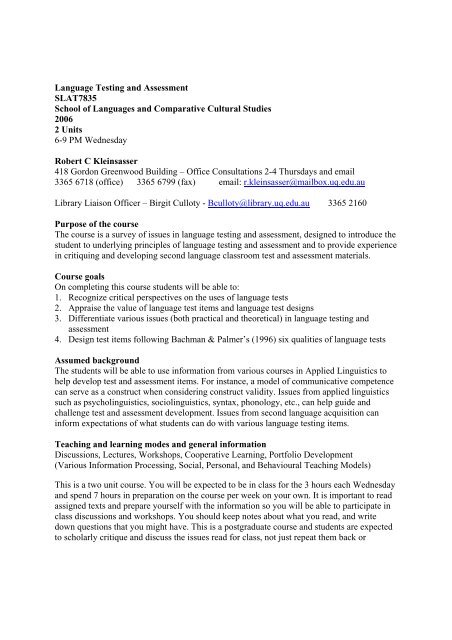
![[first_name] [last_name] - School of Languages & Comparative ...](https://img.yumpu.com/50270271/1/184x260/first-name-last-name-school-of-languages-comparative-.jpg?quality=85)
